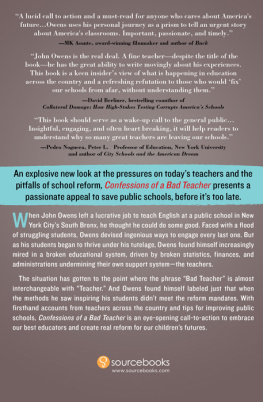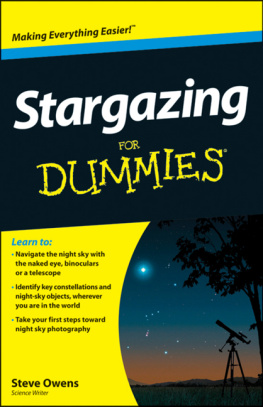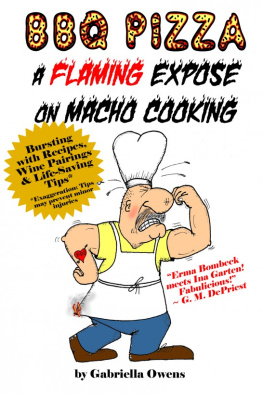Praise for Confessions of a Bad Teacher
If poor city and suburban schools had more bad teachers like John Owens, theyd be much more places of dreams than despair. Teachers are on the front line of respectand deserve to bein The System.
Lawrence Levy, Dean, National Center for Suburban Studies, at Hofstra University
Confessions of a Bad Teacher is hyperbole as a title but dead-on in its characterizations, and reveals the weaknesses of the criticisms, the true fault-lines in public education, and the nobility of a profession being treated unfairly.
Dr. Robert A. Scott, President, Adelphi University
A compelling and thoughtful personal narrative about corporate school reforms war on teachers.
Michael Klonsky, PhD, DePaul University
This book is Freedom Writers meets One Flew Over the Cuckoos Nest. Inspiring and heartbreaking.
Angela Susan Anton, Publisher, Anton (Long Island) Community Newspapers, New York
Confessions of a Bad Teacher by John Owens is a vivid account of life in the corporate school reform trenches, with all the agony, comedy, hope, and humiliation experienced by so many of todays public school teachers. Owens goes beyond telling war stories to reflect on the big picture of bad policies and politics that drive the school day, and to offer some steps readers can take to preserve and protect the precious gift of democratic public education.
Julie Woestehoff, cofounder, Parents Across America
John Owenss Confessions of a Bad Teacher offers a devastating portrait of the utter failure of the school reform movement at ground zero: the school, the classroom, and the teacher under assault.
Norm Scott, founding member of the Independent Community of Educators
Heres the soul-wrenching scoop on what happens when a middle-aged professional whos great with kids, loves literature, and wants to give back decides to become a teacher. Being willing to work from 5 a.m. to 10 p.m. is not enough in the face of a broken system that includes a crazy principal. This is a book every urban teacher can relate to and everybody else should read.
Susan Ohanian, author of What Happened to Recess and Why Are Our Children Struggling in Kindergarten?
Our media has found an easy scapegoat in Americas teachers. An antidote to such propaganda, Confessions of a Bad Teacher by John Owens gives readers an insight into the conditions in which too many of Americas teachers workdiscouraging and disparaging. Owens writes as one who has been there, and his veracity at once discourages and inspires; he has given a voice to teachers, a voice that parents and the polis need to hear.
Dr. Joseph DAngelo, Fellow, Teacher of the Year, Harvard Club
Copyright 2013 by John Owens
Cover and internal design 2013 by Sourcebooks, Inc.
Cover design by Ty Nowicki
Cover photos istockphoto/EyenEye, Ocean/Corbis, Sharon Dominick/Getty
Sourcebooks and the colophon are registered trademarks of Sourcebooks, Inc.
All rights reserved. No part of this book may be reproduced in any form or by any electronic or mechanical means including information storage and retrieval systemsexcept in the case of brief quotations embodied in critical articles or reviewswithout permission in writing from its publisher, Sourcebooks, Inc.
This book is a memoir. It reflects the authors present recollections of his experiences over a period of years. Some names and characteristics have been changed, some events have been compressed, and some dialogue has been re-created.
All brand names and product names used in this book are trademarks, registered trademarks, or trade names of their respective holders. Sourcebooks, Inc., is not associated with any product or vendor in this book.
Published by Sourcebooks, Inc.
P.O. Box 4410, Naperville, Illinois 60567-4410
(630) 961-3900
Fax: (630) 961-2168
www.sourcebooks.com
Library of Congress Cataloging-in-Publication Data is on file with the publisher.
For Aidan and Demetria
CONTENTS
America has met the enemyteachers.
Wait! I dont want to leave these kids. And they dont want me to leave.
Take it from a teacher: Run! Run away! Really, I mean it!
Can you find the lazy do-nothings in this picture?
In this class, were all writers.
The power of positive delusion as an organizing principle.
This is the secret sauce. But whats the recipe?
The life of the traveling teacher.
The music department is kept in a closet. And the librarywhat library?
How to perform choreography with a stopwatch.
Lesson 1. Never poke the principal.
How can we tell whos good and whos bad?
Those who insist they arent lying are liars.
Ten things about education that nobody wants to hear these days.
There is hope. Heres how to help.
INTRODUCTION
Will non-English-speaking students start speaking English because their teachers were fired? Will children come to school ready to learn because their teachers were fired?
Since we cant fire poverty, we cant fire students, and we cant fire families, all that is left is to fire teachers.
Diane Ravitch, Former U.S. Assistant Secretary of Education, Author of The Death and Life of the Great American School System: How Testing and Choice are Undermining Education
After we read the section of Homers The Odyssey where Odysseus and his men confront the Cyclops, we watched a movie clip of how the clever Greek hero blinded that wine-swilling, man-eating, one-eyed monster and escaped. We discussed the story for a while, and I then asked my eighth-grade class to break up into groups and write down various plot points. After about ten minutes, we reviewed the points out loud.
The kids loved the blood, bellowing, running around, and sailing away. But there was a lot of confusion about who was who and what was going on. In other words, a lot of the students were having a tough time figuring out the story. So I set to work helping them figure it out. After all, its hard to understand the significance of a story if you dont understand the story itself.
The assistant principal, who was observing the class, later scolded me for the lessons lack of academic rigor. Instead of merely identifying what was going on, he believed we should have been working higher up the cognitive food chain by analyzing, differentiating, and inferring everything from motivations to psychological states of the characters.
Yet the assistant principal knew as well as I did that at least one of these eighth graders could barely read. Alfred, a thirteen-year-old recent immigrant from Ghana, would smile brightly whenever I glanced his way and pop out of his seat proudly, standing straight and tall next to his desk, whenever he answered a question. But reading comprehension was another matter.
One day during lunch, I pulled him aside and gave him some fourth-grade reading material and multiple-choice questions about the text to get a basic sense of his reading level. How was that? I asked.
Easy, Alfred responded, smiling. Easy.
But looking at the answers he had circled on the quiz, I could see that he had no idea what the material said. Each day Alfred handed in homework, but it never was related to the assignment; it was merely a neatly copied version of what I had presented the day before on the whiteboard or Smart Board. On tests and quizzes, Alfred copied whatever was on the paper of the student next to him and smiled brightly whenever I gave him a look of What are you doing?













